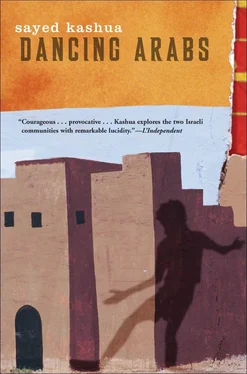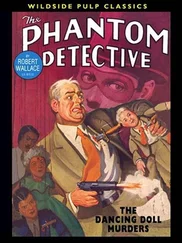The whole village knew the Jews were coming. A week before the visit, each of us got a letter asking our parents to be prepared, not to do anything that would embarrass us, to make a good impression. My mother took the day off, so she’d have enough time to cook and straighten the house. She only had two classes that day anyway, and she made arrangements for a substitute. The women and the children who didn’t go to school came outdoors early to wait for the Jews. My mother prepared a meat seniyyeh with tehini, maklubah, melukhiyyeh with chicken, and a salad. She set the table, bought a potted plant made of plastic, and dressed up.
Nadav was okay. I didn’t know much Hebrew, but he was okay. Nice. What I didn’t understand was why he called our loaves of bread pitta. In Tira, pitta is what you call a roll. The bread that the Jews call pitta we call bread.
Two weeks later we went to Kfar Sava to visit them, while a second group of Jews went to Tira. Their school looked completely different. They had loudspeakers in the yard, and they listened to music during recess. I saw a boy and girl walking arm in arm and waited for someone to hit them. I looked for Nadav and realized they’d made a mistake. The class they’d sent to Tira today was the same one that had visited already.
They paired us off, a Jew and an Arab. Some Jews got two Arabs. They matched me up with someone new. I didn’t even ask his name. Pretty soon we figured out that the Jews weren’t taking us to their homes. They’d prepared food for us at school; they’d set a table with loaves of Yahud bread, chocolate bars, and jam.
I didn’t eat anything. I felt let down. How dare they give me a new friend? After my father had finally managed to teach me how to pronounce Epstein properly. The Arabs stood on one side, the Jews on the other. I was on the verge of tears, but I decided to hold back. I was upset with myself for caring which Jew they brought me. As if I’d even understood what Nadav had been talking about. Nobody really cared anyway. I bet Nadav didn’t even notice they’d switched classes. Our teachers kept mumbling about the food. They’d been sure the Jews would take us home, and now they realized they’d dressed up for nothing.
Suddenly our principal came running over, all upset and perspiring, trying to fix his hair as he ran. He came directly to me. “Come on,” he said. “They sent the wrong class. I’m taking you back to Tira with me.” I never would have believed I’d actually get to ride in the principal’s car. The principal told me that Nadav wouldn’t stop crying because they’d switched classes. He refused to go with anyone but me. He screamed like a little child, the principal said. “He has a real problem, that kid. You’ve got to calm him down,” he added. He’d wanted to take Nadav home, but the vice principal said it wouldn’t be nice to take a Jewish boy home crying.
I was so happy. Nadav felt the same way I did. That Jew really did love me.
The geography teacher was the scariest teacher and the strongest. Once he grabbed Yakub by the ears and swung him in the air. Yakub was the biggest boy in the class. His legs hovered in midair and twisted around, and then the teacher hurled him against the blackboard. Bang!
We didn’t say a word. We froze. Then a few kids laughed at Yakub.
The Arabic teacher would come in, make the rounds of our desks, and check to see who had done their homework. Invariably, half the class hadn’t done it. They couldn’t even read or write, so how could they do homework? She had a metal ruler, and anyone who hadn’t done his homework would be tapped on the head and made to stand with his face up against the blackboard.
When she’d finished her inspection, they all lined up in front of her, well drilled, never complaining. They didn’t try to get away or talk their way out of it, because they knew anyone who tried to pull anything would get a double dose. They would bow their heads, shut their eyes, grit their teeth, and stretch out their hand as far as possible. The hand mustn’t be close to the body, because the teacher didn’t want to come near the lice and smelly clothes of anyone who hadn’t done his homework. The Arabic teacher would hold the ruler tight and hit the culprit on the back of the hand with all her strength, and she was very strong.
Almost all the teachers hit us. Some of them would walk through the class holding a hose. Others had a long thin bamboo cane. In the teachers’ room there was a whip, and the teachers who were on yard duty would wave it as they watched over us in the yard during recess. The science teacher hit me with it once while I was taking a leak. He came into the toilets, which were filthy as usual, and whipped anyone who happened to be there. “Animals! Pigs!” he shouted. The whip stung, but it wasn’t too bad.
I got fewer beatings than anyone else, fewer than the girls even. I always did my homework. I never made noise in class. I didn’t talk with anyone. I spent recess at my desk with my hands folded. Some teachers favored the peer pressure system: If the class had been too noisy during recess, everyone who’d been there got a beating. Everyone except the ones whose parents taught at the school. They were exempt.
The taftish was the most frightening of all. The nurse would come in, in the middle of class, and each of us — knowing the routine — would take out our cotton handkerchief right away, spread it out in front of us, and place our palms on top of it. If you didn’t have a handkerchief, you got hit. If you’d used it and it was dirty, you got hit. Anyone whose hands were dirty or whose fingernails were long got sent home. I always had a handkerchief. I had two, in fact — one that stayed clean for the taftish and one that I used.
The nurse would pick out a few kids at random and, with two thin sticks, she’d inspect their hair for lice. She’d always find some, and she’d scream and hit the culprit. Whichever teacher happened to be in charge of the class would help her. The two of them would write I have lice on a piece of paper, stick it on the foreheads of the ones who’d been checked, and send them home. “It’s time your mother saw what she lets out of her house,” was the nurse’s standard line. They never found lice in my hair.
Everyone at school thought it was all right to hit. The janitor too. He’d come into the classroom, and pull out three kids. Two of them would carry the black plastic garbage pail and the third would gather up the remains of the sandwiches and wrappings and cans from the yard. If the janitor decided the yard still wasn’t clean enough, you got hit. It happened to me once. One of the kids holding the garbage pail told the janitor I hadn’t picked up all the litter. He gave me one slap, just one, because the janitor was our neighbor and he knew my father.
I got two whacks on the back of my hand with the wooden ruler from the music teacher because I didn’t recognize one song he played on his oud. Once I got hit because the garbage pail in class was dirty, and it was my day to be garbage pail monitor. I got whipped across the back by the vice principal because I’d been afraid to climb onto the roof on Independence Day to stick the flag in a barrel of sand above the teachers’ room. There were no stairs.
The only one who didn’t hit us was the agriculture teacher. He was all right, died of a heart attack not long ago. He was the only teacher who came to school in a suit and tie, the only teacher who owned a car: a blue Subaru. He parked it far away from the tractors of the other teachers, which they’d use directly after school to go out to their strawberry fields. In agriculture class we cleaned the teacher’s car. We loved his car, and he was always pleased. When we finished, he’d throw us the ball. We loved to play soccer.
Читать дальше












